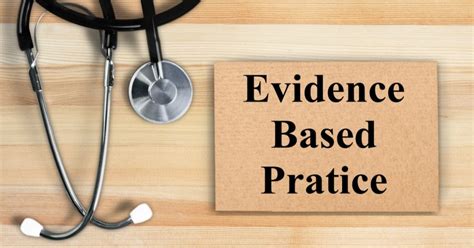As the healthcare landscape continues to evolve, nurses are increasingly expected to provide evidence-based care to their patients. But what does this mean, exactly? And how can nurses apply research with confidence in their daily practice? In this article, we'll delve into the world of evidence-based practice (EBP) and explore the key principles, benefits, and strategies for successful implementation.

What is Evidence-Based Practice?
Evidence-based practice is an approach to healthcare that emphasizes the use of current best evidence in making decisions about patient care. It involves integrating clinical expertise with the best available research evidence and patient values to provide high-quality care. EBP is not a new concept, but its importance has grown significantly in recent years as healthcare systems strive to improve patient outcomes and reduce costs.
Key Principles of EBP
So, what are the key principles of EBP? The American Nurses Association (ANA) identifies five essential components:
- Clinical expertise: Nurses must possess the necessary knowledge, skills, and experience to provide high-quality care.
- Best available research evidence: Nurses must stay up-to-date with the latest research findings and incorporate them into their practice.
- Patient values: Nurses must consider the patient's preferences, needs, and values when making care decisions.
- Integration: Nurses must integrate clinical expertise, research evidence, and patient values to provide comprehensive care.
- Continuous evaluation: Nurses must continually evaluate the effectiveness of their care and make adjustments as needed.
Benefits of EBP
So, why is EBP so important? The benefits are numerous:
- Improved patient outcomes: EBP has been shown to improve patient outcomes, reduce morbidity and mortality, and enhance patient satisfaction.
- Increased efficiency: EBP can help reduce unnecessary tests, procedures, and treatments, leading to cost savings and improved resource allocation.
- Enhanced professional development: EBP promotes ongoing learning and professional growth among nurses, which can lead to greater job satisfaction and retention.
- Better decision-making: EBP encourages nurses to think critically and make informed decisions, rather than relying on intuition or tradition.

Strategies for Implementing EBP
Now that we've explored the what and why of EBP, let's discuss some strategies for implementing it in your daily practice:
- Stay current with research: Regularly read nursing journals, attend conferences, and participate in online forums to stay up-to-date with the latest research findings.
- Use EBP resources: Utilize online resources, such as the Cochrane Library and PubMed, to access high-quality research evidence.
- Develop a culture of inquiry: Encourage a culture of curiosity and inquiry among your colleagues, and support each other in seeking out new knowledge and evidence.
- Involve patients in care decisions: Encourage patients to take an active role in their care decisions, and incorporate their values and preferences into your care plans.
- Evaluate and reflect: Regularly evaluate the effectiveness of your care and reflect on areas for improvement.
Overcoming Barriers to EBP
Despite the many benefits of EBP, there are still barriers to implementation. Some common challenges include:
- Limited time and resources: Nurses often report feeling overwhelmed by their workload and lacking the time and resources to engage in EBP.
- Lack of knowledge and skills: Nurses may feel uncertain about how to critically evaluate research evidence or apply it to their practice.
- Resistance to change: Some nurses may be hesitant to adopt new practices or challenge traditional approaches to care.
To overcome these barriers, it's essential to:
- Prioritize EBP: Make EBP a priority in your daily practice, and allocate time and resources accordingly.
- Seek support and mentorship: Identify colleagues or mentors who can provide guidance and support in implementing EBP.
- Develop a growth mindset: Be open to new ideas and willing to learn and adapt in response to new evidence and changing circumstances.

Conclusion
In conclusion, evidence-based practice is an essential component of high-quality nursing care. By understanding the key principles and benefits of EBP, and implementing strategies for successful implementation, nurses can provide the best possible care for their patients. Remember to stay current with research, involve patients in care decisions, and evaluate and reflect on your practice regularly.
Now, it's your turn! Share your experiences with EBP in the comments below. What challenges have you faced, and how have you overcome them? What strategies have you found most effective in implementing EBP in your daily practice?






What is evidence-based practice in nursing?
+Evidence-based practice in nursing is an approach to care that emphasizes the use of current best evidence in making decisions about patient care.
What are the benefits of EBP in nursing?
+The benefits of EBP in nursing include improved patient outcomes, increased efficiency, enhanced professional development, and better decision-making.
How can nurses implement EBP in their daily practice?
+Nurses can implement EBP in their daily practice by staying current with research, involving patients in care decisions, and evaluating and reflecting on their practice regularly.
